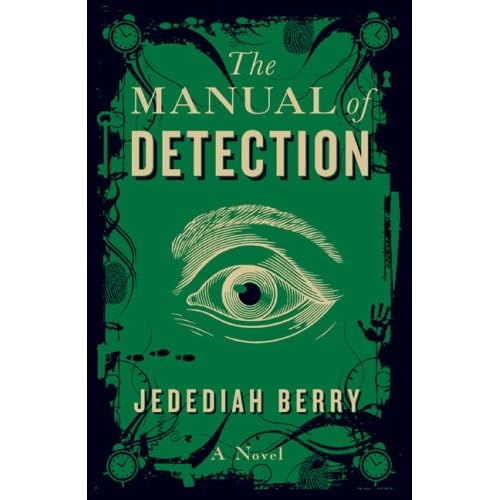 In the past year or so, various speculative fiction authors have forayed into the mystery genre: The City in These Pages by John Grant, The Little Sleep by Paul G. Tremblay, The City & The City by China Mieville, and Finch by Jeff VanderMeer. One of the problems in reviewing such books is that it's difficult to talk about them without giving away spoilers. To insinuate that there's more to them than a conventional mystery IS already a giveaway of some sort, although to be fair, the success of such books goes beyond the revelation of a specific plot point. Jedediah Berry's The Manual of Detection is one such novel and despite the proliferation of the noir-weird (nwoird?), or whatever you like to call it, Berry manages to retain a unique voice and style.
In the past year or so, various speculative fiction authors have forayed into the mystery genre: The City in These Pages by John Grant, The Little Sleep by Paul G. Tremblay, The City & The City by China Mieville, and Finch by Jeff VanderMeer. One of the problems in reviewing such books is that it's difficult to talk about them without giving away spoilers. To insinuate that there's more to them than a conventional mystery IS already a giveaway of some sort, although to be fair, the success of such books goes beyond the revelation of a specific plot point. Jedediah Berry's The Manual of Detection is one such novel and despite the proliferation of the noir-weird (nwoird?), or whatever you like to call it, Berry manages to retain a unique voice and style.The first thing that pops out is Jedediah's language and tone. The Manual of Detection leans more towards the abstract, focusing less on the telling details of its fictional city and emphasizing more on the trials and emotions of its protagonist. It establishes a quick and catchy beat that's easy to get into. In fact, the novel snapped me out of my annual reading fugue. Berry is an example of how mysteries don't have to be overwhelming to be effective.
The second element that pops out is the conceit that the Manual of Detection is an actual artifact in the story. A supposed guide for employed detectives, excerpts from the fictional Manual of Detection precedes each chapter. While some authors might simply use this is a gimmick, Berry manages to integrate this into his narrative, from the number of chapters in the novel, to hinting at key events in the story. A supplement to this is the mythos that the author successfully conjures and convinces the reader that there is a backstory to everything that takes place.
Third is Berry's faithfulness to the genre he's writing for. The private detective novel has certain tropes and this book follows those conventions, although it is not without the author's own subversions. Also, right from the start, Berry hints at something bizarre, a quality that tickles your fancy and evokes qualities of magic-realism without immediately being pegged as a fabulation.
If you get right down to it, however, The Manual of Detection reminds me that reading mysteries is fun. Berry is playful and whimsical in certain parts of the narrative, and his enjoyment of writing the book is conveyed to the reader. The preposterous situations that our main character finds himself is endearing to me, and what makes this book work is how Berry strikes a balance between that aspect and the deadly seriousness of it all.
No comments:
Post a Comment